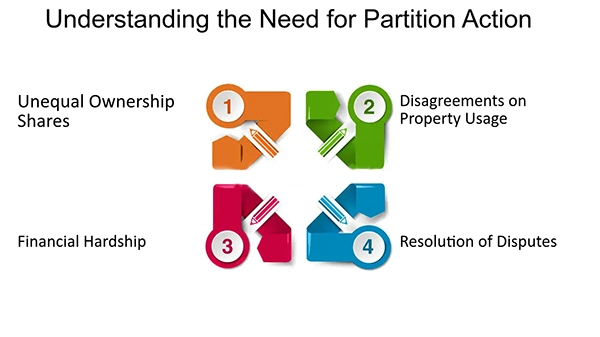Have you ever found yourself in a tricky situation where co-owning property leads to disagreements? Maybe it’s a family inheritance, or perhaps an investment property shared with others.
Dividing properties can be an emotionally charged process, especially if it involves the family or some of your close associates.
Whether you’re facing a partition action due to family inheritance, business dissolution, or any other circumstances, understanding the legal framework is always crucial.
So, in this read, you’ll be diving deep into the key steps and strategies to successfully navigate the partition action.
Let’s get straight into it!
What Is a Partition Action?
A partition action is a legal process that allows co-owners of a property to divide or sell it. This can happen for many reasons, like personal disputes, financial disagreements, or changes in the co-owners’ lives.
When people jointly own a property, they may not always agree on how it should be used, maintained, or sold. If they can’t come to a mutual decision, a partition action can provide a fair solution.
In a partition action, one or more co-owners go to court to request that the property be divided or sold. If dividing the property isn’t possible, the court may order a sale. The proceeds from the sale are then divided among the co-owners according to their ownership shares.

When to Consider a Partition Action
One reason is when co-owners disagree on selling the property. For example, if one owner wants to sell and the other doesn’t, they might end up at a standstill.
Another common reason is when one co-owner is not paying their fair share of property expenses, such as mortgage payments, taxes, or maintenance costs. When this happens, the other co-owner may feel it’s unfair to bear all the financial responsibility.
Partition actions can also be useful when co-owners have different visions for the property. For instance, if one wants to rent it out and the other wants to live in it, a partition action can provide a solution.
It allows the court to decide the fairest way to handle the property. In cases where relationships have become strained, a partition action can be a way to resolve the issue and move forward.
Steps in the Partition Action Process

While each case is unique, these are the main steps that co-owners typically go through when filing a partition action.
Filing the Lawsuit
The first step is to file a partition lawsuit in court. This requires legal paperwork explaining the situation and the desired outcome.
This paperwork usually states whether the person filing wants the property divided or sold. Filing this lawsuit officially starts the partition action process.
Appointing a Real Estate Professional
Once the lawsuit is filed, the court often appoints a real estate professional to assess the property. This could be an appraiser or another expert who can determine the property’s value.
Knowing the value helps the court understand how much each co-owner should receive if the property is sold. This step is important for ensuring a fair outcome.
Attempting Mediation
Many courts encourage co-owners to try mediation before proceeding with a full partition trial. Mediation is an informal process where the parties try to reach an agreement outside of court.
Sometimes, with the help of a mediator, co-owners can find a solution that avoids a court-ordered sale or division. If mediation is successful, it can save time and money for everyone involved.
Court-Ordered Sale or Division
If mediation doesn’t work, the court will decide whether to sell the property or divide it. Most properties, especially homes and buildings, are not easily divided, so the court may order a sale instead.
When this happens, the property is sold, and the money is divided according to each co-owner’s share. This step ensures that all parties receive their fair portion of the property’s value.
Do You Know?
Beyond the legal and financial implications, property disputes can also take a significant emotional toll on individuals and families.
Choosing the Right Real Estate Partition Lawyer

Navigating a partition action can be complex, so having a skilled real estate partition lawyer is essential. This type of lawyer has experience in partition actions and can guide you through each step. They help prepare the necessary paperwork, represent you in court, and provide advice on how to achieve the best outcome.
A good real estate partition lawyer also explains your rights and responsibilities as a co-owner. They can help you understand your options, whether it’s negotiating with other co-owners, going to mediation, or preparing for trial.
For example, if you’re in the Sacramento area, you might consider consulting a Sacramento Partition Lawyer for expert local advice on partition actions.
How to Prepare for a Partition Action
First, gather any documents related to the property. This includes the deed, mortgage information, tax records, and any agreements made with co-owners. Having these documents ready will make it easier for your lawyer to build a strong case.
It’s also helpful to review your financial situation. Partition actions can involve costs, like court fees and lawyer expenses. Understanding these costs in advance helps you budget for the process.
Additionally, be ready to discuss your preferred outcome with your lawyer. Having a clear goal, whether it’s selling the property or seeking compensation for unpaid expenses, can guide the case in the direction you want.
Potential Outcomes of Partition Actions
A partition action can have several possible outcomes, depending on the court’s decision and the specific circumstances of the case. Knowing these outcomes can help you feel more confident about the process.
One common outcome is a court-ordered sale of the property. If the court orders a sale, the property is sold, and each co-owner receives a share of the proceeds based on their ownership percentage.
Another possible outcome is an agreement between the co-owners during mediation, which may result in one co-owner buying out the other’s share. In rare cases, if the property can be physically divided, the court might order a division, giving each owner a specific portion.
Understanding How This Process Works Is Essential for Anyone Facing Partition Action Dispute
Partition actions are valuable tools for resolving property disputes among co-owners. They provide a structured way to address disagreements and ensure that each party’s rights are respected.
By following the right steps and working with a knowledgeable real estate partition lawyer, co-owners can navigate this process smoothly. A partition action helps you make clear decisions about jointly-owned property, whether it leads to a sale or a buyout.
In the end, this process can help co-owners move forward with a fair and balanced resolution. Did you like this guide? Great! Browse our website for more!








